2400 BCE - 1600 BCE: The Barrow Builders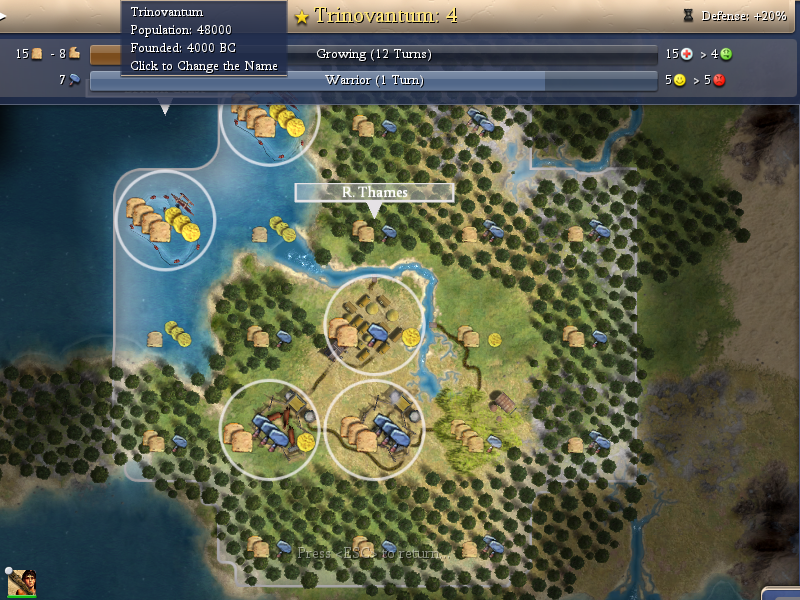
A splinter clan from the Trinovantes, the Cantiaci, is believed to have emerged during the early 24th century BCE. This coincides with the further growth of Trinovantum, reaching some 48,000 permanent inhabitants. Myths of the cruelty of the Trinovantes begin to die off during this period, so it seems likely that unrest declined in the city and its surrounds.
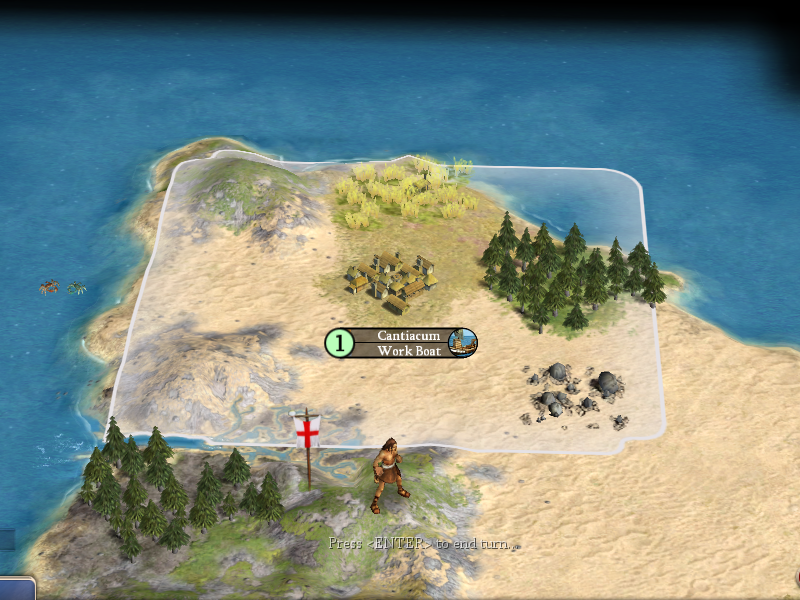
The late 23rd century BCE saw the development of Judaism elsewhere in the world, whilst Britain continued to struggle through its traditional forms of paganism without any clear, organised religion. It is to this century that we can date the earliest foundations of Cantiacum, the Cantiaci colony founded amidst the wastes of western England. Whilst certainly a miserable, wretched location, the ever-burgeoning demands of trade most likely compelled the Cantiaci to form their town. Local emmer (a form of wheat) was plentiful, West Anglia has traditionally been excellent crab country, and the greatest demand of all was granite. West Anglia even today still houses some of the finest, most plentiful granite in the world, and it was this heavy demand that would shape the future.
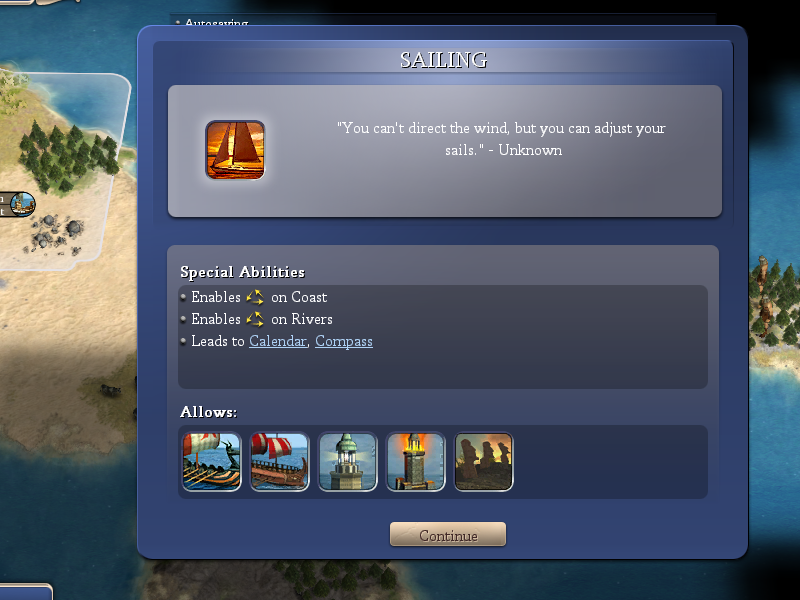
In particular, the need for heavy transport dramatically accelerated the design of ships in the era. Whereas traditionally nothing more elaborate than fishing boats had been built by the Britons, larger galleys were seen in this period as a way of moving much-needed stone and copper from Cantiacum and Ambianum via coast and river to Trinovantum.
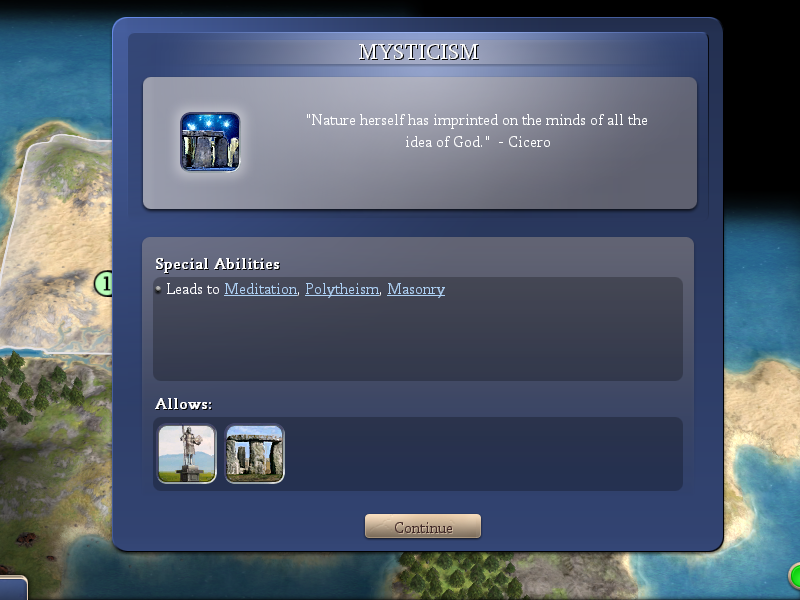
It was only by the early 21st century BCE that the Britons began to truly formalise their beliefs, particularly in the goddess Victory, with an entrenched sense of mysticism. The advent of sailing as a technique for spreading ideas is held to have sparked something of a religious revolution at the time.
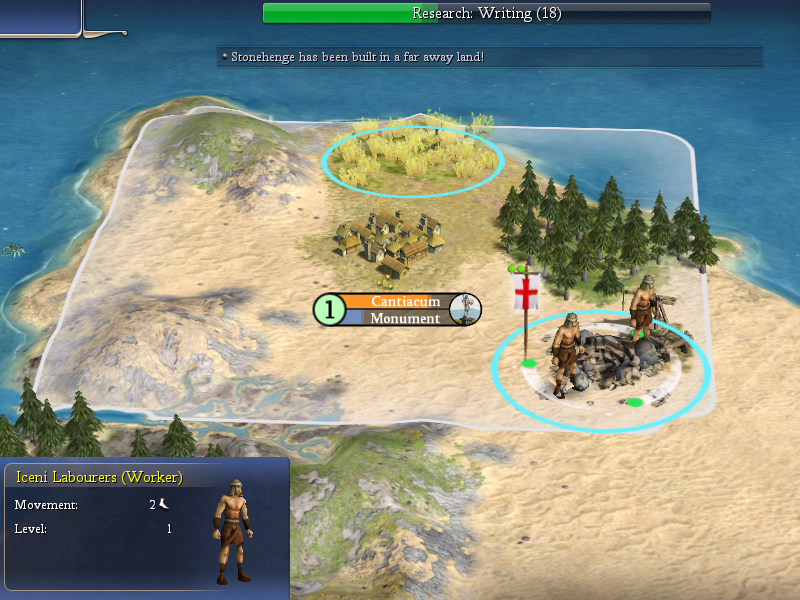
By the time Stonehenge was built elsewhere in the world (circa 2010 BCE), Cantiacum had developed a well-established an efficient network of granite quarries, shipping tons of stone at a time to Trinovantum and other parts of the British network of settlements. Although the settlement remained small, the Cantiaci were unusually wealthy for the era - if as a result of the back-breaking labour of their Iceni workers. Granite began to be incorporated in large part in the barrows of the Trinovantes, which became more and more elaborate and often impressive above-ground structures.
The 20th century BCE saw the construction of monuments by chieftains, typically in an effort to commemorate their deeds or the deeds of their ancestors. Whilst indulgent and boasting (and at times outright false) these monuments helped to cement tribal identites and to record the deeds of a clan. The 20th century also saw a period of growing discontent amongst the other tribes of Britain, with many seeking to seize the fruits of Briton labours by force. In response, new splinter warrior clans developed, such as the Atrebates descending from the Ambiani.
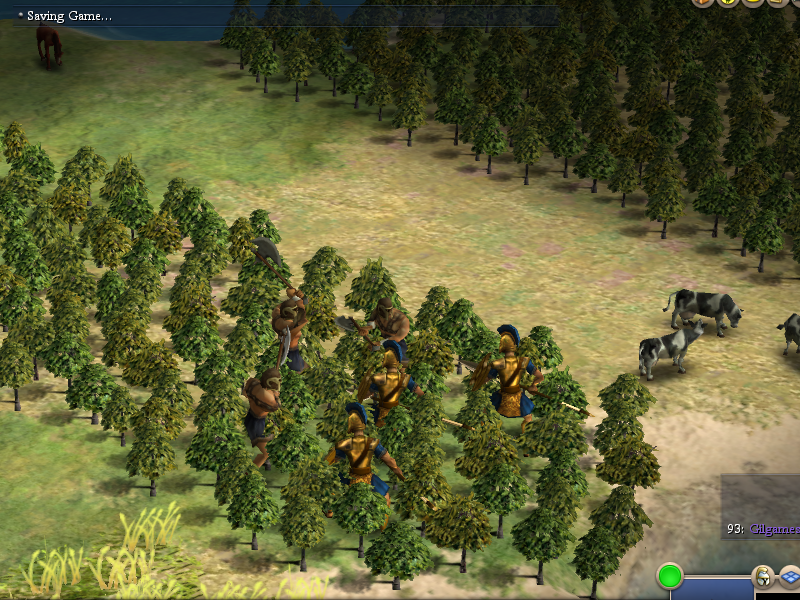
The turn of the 19th century BCE (1900-1800 BCE, for those students amongst you who are getting confused by the terminology) saw the Great Wall being built elsewhere in the world, a land untroubled by the difficulties of their more violent tribal neighbours. In Wales, local Silures spearmen frequently engaged in skirmishes with the Atrebates and Ambiani over territory. The Atrebates, however, in pooling their wealth had begun to make use of bronze axes, a technology that despite existing for over two thousand years had not been extensively used because of the costs involved in equipping large numbers of men with bronze.
As an addendum, the great wonders of the ancient world became increasingly popular in this time, with the Temple of Artemis constructed once again in foreign lands by 1800BCE.
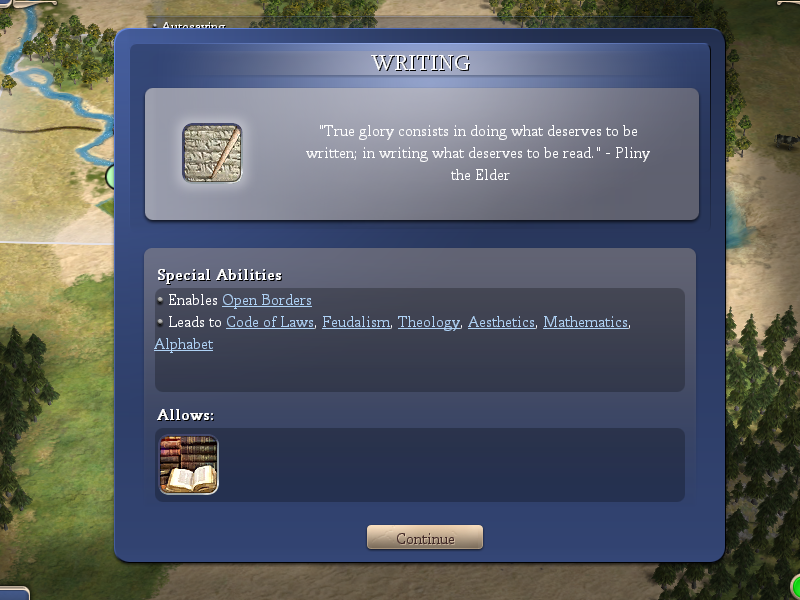
The advent of pictographs in recording the deeds of ancient chiefs necessitated a more advanced and durable method of retaining knowledge for the future. The oldest record we have of a true written word dates back to 1780BCE, on three tablets dictating the achievements of a petty king called Brandon (or possibly Brendan). Over the next century writing seems to become more profilic, with writing materials and damaged records found in barrows even where legible text is not. Barrow walls became more elaborate, often made of granite with carved writing detailing the life and times of the deceased.
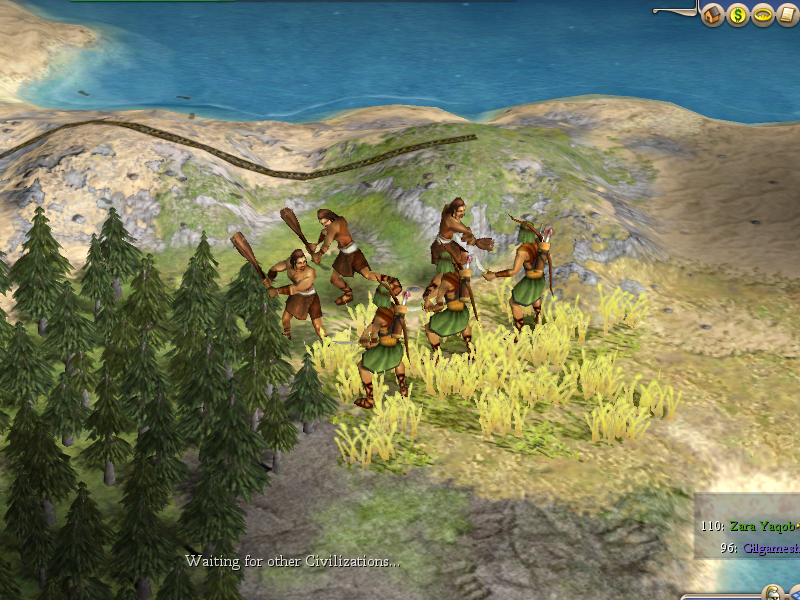
By the time of the 17th century BCE, the Brigantes of West Anglia had developed the shortbow, a weapon that had thus far eluded the Cantiaci, steadfast melee fighters who for the most part were still using clubs and simple spears. Whilst the Cantiaci remained able to chase off the Brigantine raids, they found themselves on the losing side of an arms race.
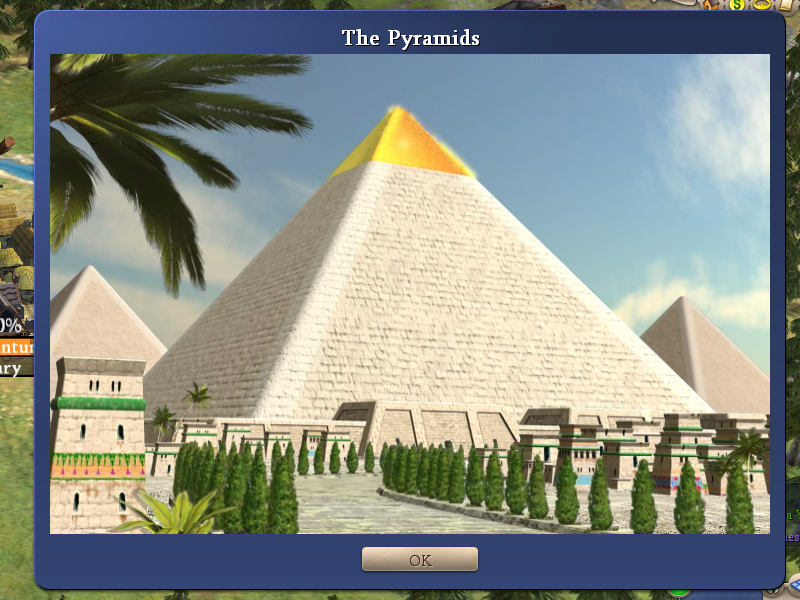
In 1640BCE, the Great Pyramid of Trinovantum was completed, the greatest and last of the great Trinovantes barrows. It interred Imanuentius, king of Trinovantum and the Trinovantes, and the pyramid included not merely his own tomb but barrows for all of his bondsmen, servants and wives. The demand for grave gifts and construction materials was so great that it contributed in large part to the deforestation of the Bronze Age forests surrounding Trinovantum (although in large part this was due to increased demand for farmland).
Unfortunately for Imanuentius' successors, the vast exploitation of the Iceni and other clans under the Trinovantes, whilst never reaching the point of actual slavery was still considered by many to be intolerable, especially in the light of such grand works. Shortly after Imanuentius' death in 1630BCE a series of uprisings and clan wars occured that would carry on for most of Imanuentius' son Mandubracius' life. Mandubracius spent twenty years fighting and treating, eventually reaching peace more through force of words than force of arms; in 1620 BCE Mandubracius met with the petty kings of the Ambiani, Atrebates, Dumnonii and Cantiaci and agreed upon a formalised government of the tribal states of Britain. Each clan would send forth their own king to be part of a ruling council, with a High King chosen from amongst them. In this way the Britons would be represented (with, admittedly, the exception of the Iceni) and so relative peace would reign. For his efforts, the petty kings did select Mandubracius to be the first High King. He ruled for 41 days.
Mandubracius ultimately never completed his own pyramid and was interred in a smaller tomb attached to his father's grand barrow. This would set the tone for later barrows; some would be humble, others exquisite, but no barrow would ever match the sheer extravagance of the Great Pyramid that was Imanuentius' tomb.[/i]
[We just adopted the Representation civic, made possible because the Great Pyramid gives access to all government civics once built. This gives us a +3 Happiness bonus to our largest 6 cities (we have 3) and +3 beakers to any specialists. We aren't using specialists, but the happiness bonus is essential to growth since we lack religion and we don't have enough cities or gold to make Universal Suffrage worthwhile.]
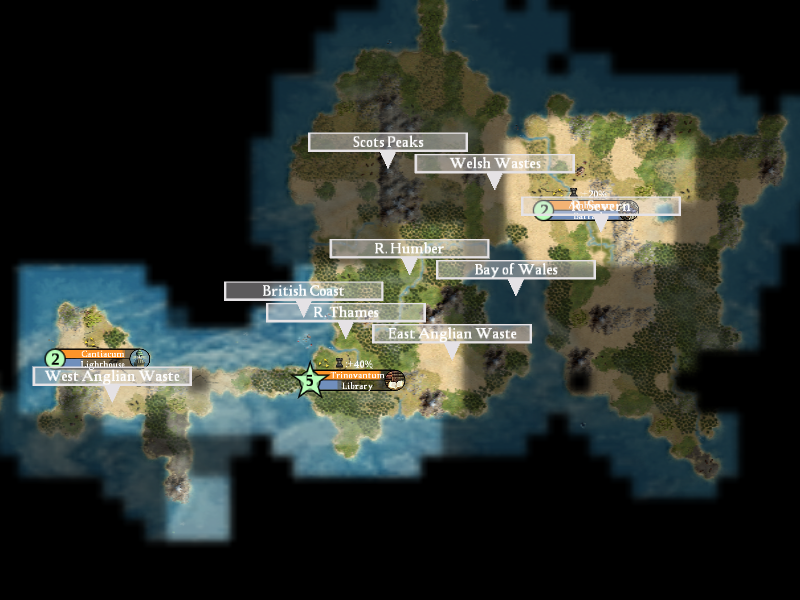 A map of Britain, circa 1600BCE. Ethiopia is to the south-west.
A map of Britain, circa 1600BCE. Ethiopia is to the south-west.
Right, but they're related to the mainland Belgae. I remember in my book of the author mentioning a tribe and specifying they were unrelated to a mainland tribe of the same name. I though those were the Belgae, and that as such the Belgae of your LP would be unrelated to the one peopling what is now Belgium, and with whihc, thanks to bad 19th century history, I tend to identify.
However, I was wrong in this case, as they are in fact the same tribe (or an offshoot of said tribe), and I get to roots for them. Yay! Cannot wait for the Queen's Own First Belgian Rifles to crush some Ethiopians in a few millenia. 
Out of curiosity, if you try to present this as some kind of English history, will we have a Norman takeover?
Norman-ish. Depends on when we have revolutions and which civs we meet. I'll try to at least turn Trinovantum into London at some point. Also, technically the British Peninsula is actually the British Isle. Perhaps the land bridge sank in the intervening two thousand years?

 Author
Topic: Civ IV - Let's Try the British Empire: The Industrial Revolution (Read 17074 times)
Author
Topic: Civ IV - Let's Try the British Empire: The Industrial Revolution (Read 17074 times)
